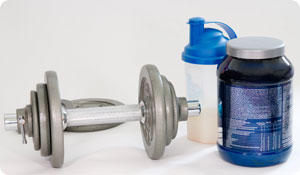
See what people are saying about this article on our Facebook page!![]()
Judging from the variety of products on the market promising bigger, stronger muscles and better performance on the field (or at the gym), it appears that exercise alone just doesn't cut it anymore.
But in spite of the marketing claims, are protein powders really necessary for the typical weekend warrior or average guy who can't get to the gym more than a few times a week?
Courtney Gravenese, MS, RD says for the most part, the answer is no. "Protein powders may have a role for extreme athletes. Someone like Michael Phelps who needs 5,000 to 6,000 calories a day to support his workouts probably augments his diet with some kind of supplement. Supplements can be a convenient way to get the extra calories your body needs when you're on a rigorous training schedule."
Manufacturers argue that adequate protein is required for muscle growth and repair. But another dietician, Jenna A. Bell, PhD, RD, CSSD points out that protein comes in various forms. "A turkey sandwich can provide protein, too," says the nutrition expert who is the co-author or Energy to Burn (Wiley 2009), "It's your choice whether you get [protein] from a synthetic product or a whole food."
Other good protein-rich ideas include fat free or one percent milk along with cottage cheese and tuna. These have all been shown to be effective non-supplement foods for post-workout rebuilding.
Synthetic Protein Pros and Cons
Protein in synthetic powders come from cows or plants and is either whey or soy based. Whey protein is a by-product of cheese made from cow's milk. Soy protein comes from the soy bean and may be preferable to people who are lactose intolerant or vegetarian.
Before purchasing a protein powder product, read the label. Many products contain other ingredients such as simple sugars like maltodextrin and dextrose, and artificial sweeteners. As a result, some are high in calories. If you aren't exercising enough to support those calories, you may want to look for a product without additives. "There's a misconception that you can eat protein and not get fat," says Gravenese. "It's simply not true. Protein has calories too, but it's hard to get people away from thinking that the way to lose weight is less carbs and more protein. What you need is a balance."
Bell likes the convenience of protein powders. "If you look for one with amino acids, you're getting a complete protein that's easy to have on the run," she says. Amino acids assist in delivering protein to the muscles more quickly. Since the product is already broken down, the body may metabolize it faster, too.
For the best post-workout snack, Bell recommends combining carbohydrates and a protein. "There is no magic food that will make your pecs pop," says the expert. "A yogurt shake, chocolate milk, sports bar, protein shake, peanut butter, whole grain pita with hummus are also good options."
See what people are saying about this article on our Facebook page!![]()
Sources:
Phone interview with Courtney Gravenese, MS, RD
Email interview with Jenna A. Bell, PhD, Rd, CSSD, and co-author of Energy to Burn (Wiley 2009) and co-owner of Swim, Bike, Run, Eat! Consulting
National Strength and Conditioning Association
http://www.NSCA-lift.org
US Dept. of Agriculture
http://www.ars.usda.gov/





